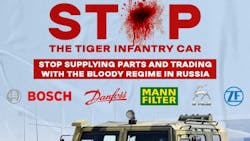Ukraine Questions Global Automotive Giants’ Parts in Russian Military Vehicles
A Ukrainian government official launched a social media campaign Monday against some of the largest automotive supply companies in the world, saying that Ukrainian armed forces found parts from ZF, Bosch, Danfoss and other global suppliers on Russian military vehicles seized as Russia pummels its Western neighbor with rockets and artillery.
“The Ukrainian armed forces seized Russian military vehicles and discovered that the Tigr and Pantsir missile system used Bosch, ZF Group, Danfoss and MANN+HUMMEL parts,” Kostiantyn Koshelenko, Ukraine’s deputy minister of social policy, posted to LinkedIn and Twitter, along with a photo of one of the vehicles with the text “Stop the Tiger Infantry Car” on it, with the O on stop showing up as a blood stain.
In responses to his post, Koshelenko added photos of specific parts from global companies on the Russian military vehicles.
Within a few hours, the largest of the companies involved had responded, mostly by saying that they haven’t supplied parts to the Russian military for many years and have cut off supplies of parts to civilian vehicles since Russia invaded its neighbor.
“Your post is very concerning to us and rightfully demands a clear and decisive answer: ZF has put on hold all deliveries to Russia two weeks ago. This includes parts and spare parts. We have not delivered parts to Russia for vehicles that can also be used by the military since at least 1 August 2014,” ZF officials said in response, noting also that the company’s charitable arm was supporting Ukrainian charities. “Your campaign is directed at the wrong target. ZF acts not only with strict adherence to international sanctions but, importantly, high ethical standards. We therefore kindly ask you to revise your social media posts. Our thoughts are with the Ukrainian people and all victims of this war.”
Thom Fladung, managing partner of crisis communications company Hennes Communications, says the war in Europe makes it impossible for companies to stay neutral.
“Russia’s attack on Ukraine is yet another example–perhaps the final, definitive piece of evidence–of how the era of businesses maintaining neutrality in the face of controversies or holding social issues at arm’s length is ended. We saw it with the social justice issues that arose in the wake of George Floyd’s killing and the Black Lives Matter movement, we saw it with COVID and now we see it with this war.”
The old days of “no comment” to controversial issues is over, so big companies must be engaged with multiple audiences.
“I hope Bosch and ZF communicated with those employees and any other critical stakeholders about the company position before posting it on LinkedIn,” Fladung adds. “The employees, in my opinion, are the critical audience here. I want them to hear directly from company leadership, not read about it for the first time on social media.”
American regulations such as the International Traffic in Arms Regulations (ITAR) and similar European rules make it very difficult for Western companies to ship components for military equipment to Russia and other countries. However, governments can easily buy off-the-shelf commodity parts from suppliers or distributors and send them to military contractors. A fuel pump is a fuel pump, in most cases, so Bosch could have parts on Russian missile launchers without ever dealing with the Russian government.
Bosch officials made that point in responding to Koshelenko.
“We take the allegations of the Ukrainian foreign minister very seriously – they were brought to our attention late [Sunday] evening and we immediately launched a thorough investigation,” Bosch officials said in their response on LinkedIn. “The Ukrainian foreign ministry contacted us directly about this and we were able to determine that while the component in question was made by Bosch, Bosch did not supply it to the vehicle manufacturer.
“Our engine and transmission components for heavy-duty vehicles have been used around the globe for many years in a wide variety of civilian applications such as logistics, disaster management and emergency services,” Bosch officials explained. “When it comes to supplying Russian automotive customers, it is a clear contractual requirement in our local agreements that Bosch products may be used in civilian applications only.”
The German automotive supplies giant added that it is complying with sanctions that should cut off civilian supplies of Bosch parts to Russia.
How to Respond
Thom Fladung, managing partner of crisis communications company Hennes Communications suggests a few basic tactics if a company has been called out on social media.Companies need to try to explain that this is complex and difficult.
- Don’t deny the obvious.
- Show some vulnerability.
- Be human in the face of a humanitarian crisis.
- And make sure, again, that you’re communicating best and most often with those critical audiences, especially your employees.
Winning debates on social media usually is impossible. Focus most on talking about what you’re doing about these sensitive issues with employees, shareholders, customers, etc.
- Just make sure you tell the truth, that you tell as much of your story as you can and that you keep telling the truth.
- Then, be transparent.
- If you’ve promised an investigation, talk about what your investigation has shown and, especially, what you are doing based on that investigation.
About the Author
Robert Schoenberger
Editor-in-Chief
LinkedIn: linkedin.com/in/robert-schoenberger-4326b810
Bio: Robert Schoenberger has been writing about manufacturing technology in one form or another since the late 1990s. He began his career in newspapers in South Texas and has worked for The Clarion-Ledger in Jackson, Mississippi; The Courier-Journal in Louisville, Kentucky; and The Plain Dealer in Cleveland where he spent more than six years as the automotive reporter. In 2014, he launched Today's Motor Vehicles (now EV Manufacturing & Design), a magazine focusing on design and manufacturing topics within the automotive and commercial truck worlds. He joined IndustryWeek in late 2021.

